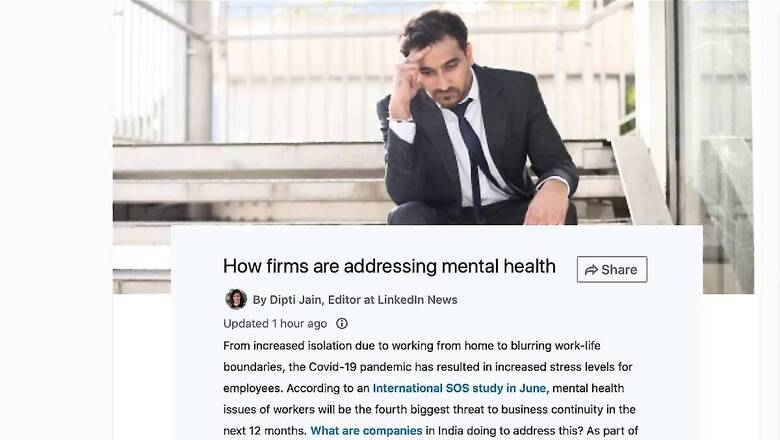
views
Work from home was supposed to be a dream situation. Work from home was supposed to save us from the time and energy wasted during commute and sitting in traffic jams. But it really hasn’t turned out that way, has it? Professional network LinkedIn has released the findings of the Workforce Confidence Index ‘mental health’ edition survey ahead of the World Mental Health Day, and it does not make for pretty reading. The report says that in India, 2 out of every 5 professionals are experiencing increased stress or anxiety due to COVID-19. The rather worrying stat is that as the pandemic shifted everyone to the work from home routine in the past few months, only 1 in 5 professionals in India were offered more time off for their well-being.
The LinkedIn Workforce Confidence Index ‘mental health’ edition survey says that only 1 in 4 professionals in India were offered flexible working hours and well-being support, that may have otherwise included emotional well-being initiatives. The findings also show that only 1 in 5 professionals were getting more time off through paid or unpaid leaves. As many as 40% of Indian professionals are continuing to experience financial instability, which is leading to high levels of financial stress. The LinkedIn Workforce Confidence Index ‘mental health’ edition survey findings come basis the responses of as many as 16,199 workers and professionals in India, as part of the larger LinkedIn Workforce Confidence Index.
The work from home culture has also not been good news for working parents, specially mothers. The survey suggests that working mothers are more likely to cope with distractions from childcare, as 36% say they are unable to focus on work with children at home, compared to 25% of working fathers. Men are also more likely to seek support from friends and family as only 23% of working mothers rely on a family member or friend to take care of their children, compared to 31% of working fathers.
“The ongoing stress around the 3 Rs — Remote work, Return to work, and Risk of exposure — are adversely impacting the mental health of Indian professionals. Companies in India are beginning to bolster their mental health programmes to support their employees in such times,” says Ashutosh Gupta, India Country Manager, Linkedin.
The LinkedIn Workforce Confidence Index ‘mental health’ edition survey comes just after the Microsoft Work Trend Index report which suggested that more than 41% of the workforce in India is dealing with increased stress levels because of the blurred lines between work and personal life. This is as a result of increased communication with colleagues and fewer boundaries with regards to time, and longer workdays. Workers in India, as many as 23% as per the survey, also say that too many meetings and not enough focus time are also contributing to the stress while working from home.
Read all the Latest News and Breaking News here

















Comments
0 comment